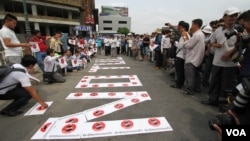Garment companies in Cambodia have warned their employees to work harder and increase productivity to remain competitive.
The Garment Manufacturers Association in Cambodia (GMAC) made the statement just days after Cambodian garment workers gathered to express their concerns over stagnated wages, forced overtime and low standards of living.
Declining production in the Cambodian garment sector combined with increasing expenses had put the country at a disadvantage when competing with other nations in the region, such as Vietnam, Bangladesh and Myanmar.
Ken Loo, secretary-general of GMAC, said in a statement that “we must contribute in the manner that our garment sector can stand in today's strongly competitive atmosphere in the world market. As employers, we need to try to contribute as much as possible in building up the skills of the workers.”
Workers’ representatives, however, argue that employers have exploited the use of short-term contracts and have fired pregnant women in contravention of the labor law.
The current minimum wage of $140 does not provide a living wage, they say.
Mak Chansitha, director of the Workers’ Information Center, told VOA Khmer that employers must not place the blame only on workers.
She added that the decline in productivity stemmed from an increase in the demand for garment products from factories.
“It's not that their work capacity falling. It's just that when the wage is raised, the quota increases. What I'm trying to say is that it's hard to reach the new quota,” she said.
She added that employers should look at the change in the production chain and the health of the workers in order to adjust to the falling productivity of workers.
Loo said that factories were facing increasing costs for electricity and transport, which had led some factories to leave the country.
Chansitha admitted that the costs borne by employers had increased and was higher than in neighboring countries.
GMAC should engage in talks with workers’ representatives, she added.
Ath Thorn, president of the Cambodia Labor Confederation, said there was still a lot of investment potential in the Cambodian garment sector.
“In Burma, there's requirement of nearly 60 percent of investment capital unlike Cambodia,” he said.
Heng Sour, spokesman for the Ministry of Labor, could not be reached this week.
About 46 percent of Cambodia’s garment exports go to the European Union, with the United States coming in second at 30 percent. The industry earned more than $6 billion in 2015, according to data from the Workers Information Center.




